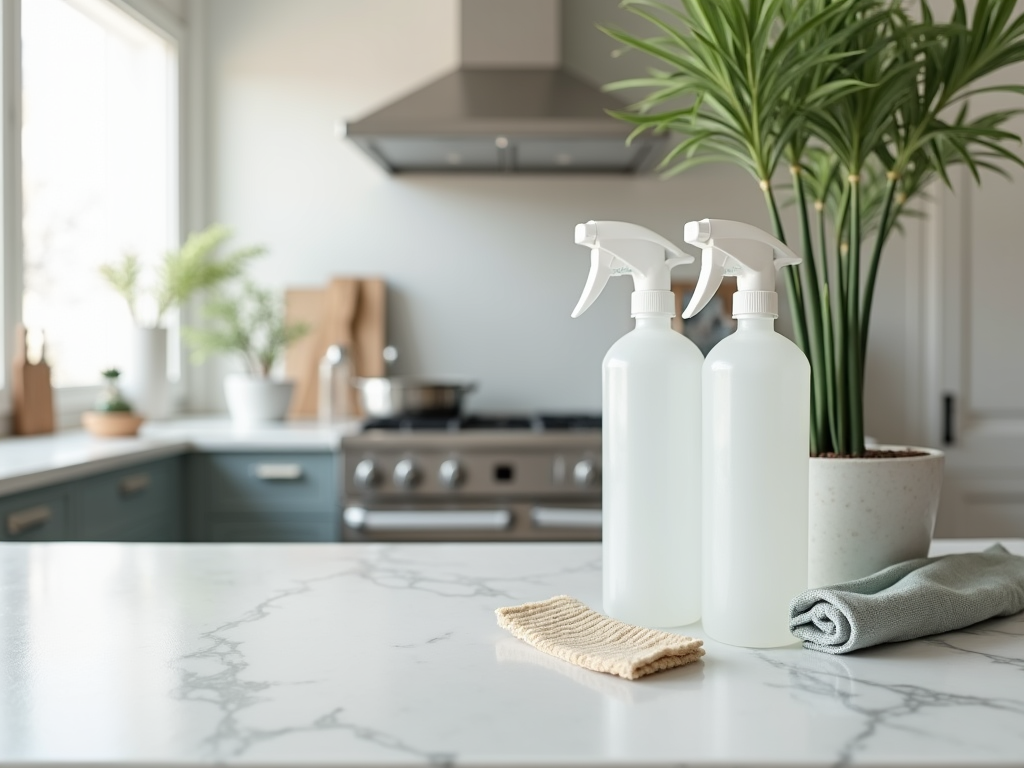Marble surfaces, with their timeless beauty, can elevate the look of any home, but keeping them pristine requires careful maintenance and cleaning. To protect the integrity of your marble, it’s essential to know how to clean and maintain it effectively. This article will guide you through the best methods for cleaning marble surfaces and offer a clever trick for dealing with stubborn stains.
Understanding Marble: The Basics

Marble is a natural stone formed from limestone subjected to heat and pressure over time. Its unique veining and colors are highly valued in decor and architecture. However, being composed primarily of calcium carbonate, marble is porous and more susceptible to stains compared to other, less porous stones. It is also prone to etching and can easily get damaged by acidic substances. Therefore, understanding the nature of marble is crucial in formulating an effective and gentle cleaning regimen to preserve its natural beauty.
Regular Cleaning Routine for Marble Surfaces

Establishing a regular cleaning routine is vital to prevent grime and dirt from accumulating on your marble surfaces. For daily cleaning, use a soft, damp cloth or mop with a mild, pH-neutral cleaner specifically designed for natural stones. Avoid using abrasive or acidic cleaners, such as vinegar or lemon juice, as these can damage the surface of the marble. Dusting with a dry microfiber cloth can also help keep your marble looking as good as new by removing surface dirt and preventing it from scratching.
- Start by dusting or vacuuming the surface to remove loose dirt.
- Prepare a cleaning solution with warm water and a few drops of a pH-neutral stone cleaner.
- Wet a soft cloth or mop with the solution and gently wipe the surface.
- Rinse the cloth or mop frequently to avoid spreading grime.
- Dry the surface thoroughly with a clean, dry towel to prevent water spots.
Treating Stubborn Stains on Marble
Despite regular maintenance, marble surfaces may occasionally develop stubborn stains. For organic stains like coffee, tea, or wine, create a paste using baking soda and water and apply it to the stained area. Let the paste sit on the stain for 24 hours before gently wiping it off with a damp cloth. Rust stains, on the other hand, may require a commercial rust remover specifically formulated for stone surfaces. Remember to always test cleaning products in an inconspicuous area first to ensure they do not adversely affect the marble.
- Mold and Mildew Stains: Use a mixture of hydrogen peroxide and water to clean the area.
- Oil-based Stains: Sprinkle cornstarch over the stain and let it absorb the oil for at least 24 hours before wiping clean.
- Biological Stains: Use a mixture of ammonia and water, but only on occasion due to potential discoloration risks.
Preventing Damage to Marble
Preventive care can significantly extend the life of your marble surfaces. Always use coasters under glasses and place mats under dinnerware to reduce the risk of scratching and etching. Seal your marble periodically with a high-quality stone sealant to provide an additional layer of protection against moisture and stains. Also, be wary of placing heavy items directly on marble surfaces to avoid any potential cracking or chipping.
Conclusion
Maintaining the beauty and elegance of your marble surfaces involves regular cleaning, proper treatment of stains, and preventive care. By understanding its properties and using the correct products and methods, you can ensure your marble remains in excellent condition for years to come. Always act quickly on spills, use appropriate cleaning agents, and remember to seal your marble occasionally to keep it looking its best.
Frequently Asked Questions
- Can I use vinegar or lemon juice to clean marble? No, vinegar and lemon juice are acidic and can etch the surface of the marble, causing damage. It’s best to use a pH-neutral cleaner.
- How often should I seal my marble surfaces? Sealing every 6-12 months is generally recommended, but this may vary depending on usage and the quality of the sealant used.
- What should I do if I spill something on my marble surface? Quickly blot the spill with a soft cloth, avoiding rubbing it in. Then clean the area with a mild cleaner and dry it thoroughly.
- Are there different cleaning methods for honed and polished marble? Yes, honed marble is more resistant to scratching, while polished marble can show scratches more easily. Use gentle cleaning methods for polished marble surfaces.
- Is it safe to use commercial cleaning products on marble? Always ensure the product is labeled for use on natural stone. Test in a small area first to ensure it does not damage the surface.
